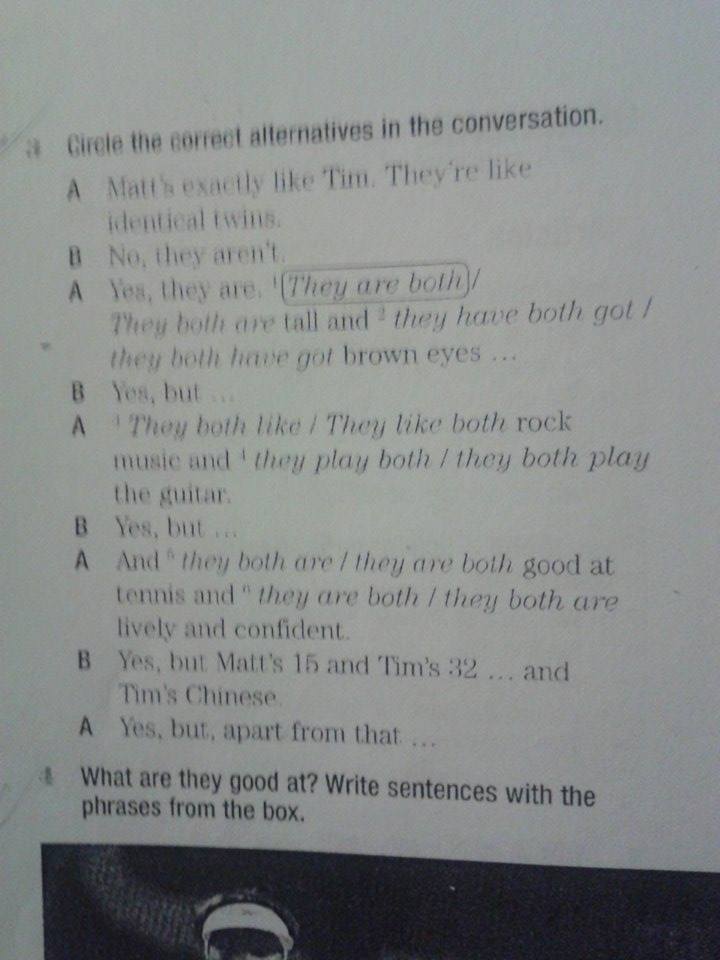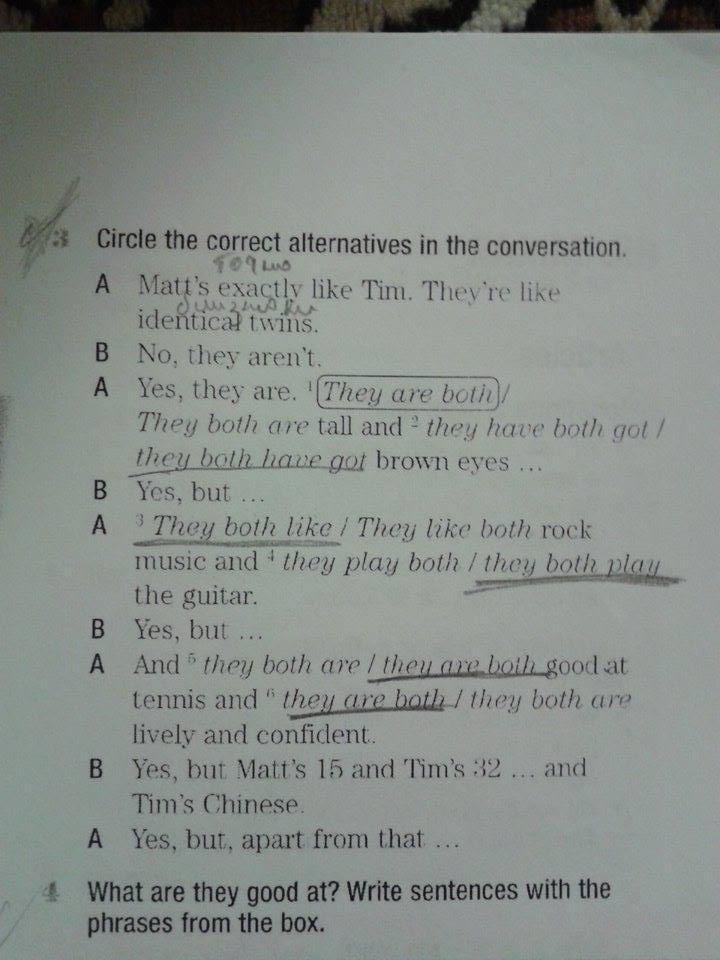There are six (6) pairs of choices in her homework: that is, six (6) questions. So that gives a total of twelve (12) choices. Of those twelve (12) choices, all except for two (2) are grammatical.
It so happens that four questions have no wrong answer, and only two questions have a right/wrong pair as answers. (Aside: I like that kind of homework!)
CAVEAT: Some of the grammar info that I'm presenting in this post might be intentionally--or unintentionally--over simplified. Hopefully there won't be any egregious errors. (I'm sure I'll get dinged if there are.)
Let's first do a little grammar review, and then later we'll look at her homework.
There are two main uses for the word "both":
One: a marker of coordination -- This is usually taught in a formal lesson. The word "both" is used to mark the first coordinate of an and-coordination of two coordinates. E.g. "He likes both apples and pears", "He likes to both run track and swim relays". This type of use is rather straightforward, and it is a basic topic taught in schools.
Two: a quantificational adjunct -- This might only be lightly taught in a formal lesson, or maybe perhaps not taught at all. The word "both" is functioning as an adjunct, which is a modifier that is optional for a given sentence. It could be omitted with no loss, or almost no loss, in meaning (usually). It behaves in a similar fashion as traditional grammar's "adverbials" (which are also adjuncts), e.g. "They would both/quickly run to school in the mornings".
It is usually possible for a speaker to place a quantificational adjunct right after the subject. (e.g. "We both can sing tonight".)
When a clause is headed by an auxiliary verb, then a speaker can usually place an adjunct right after that verb; and often there could be a preference to have the adjunct located after an auxiliary. (e.g. "They would both/quickly run to school in the mornings".)
When a clause is headed by a transitive lexical verb, then there will often be some resistance to having an adjunct located between the verb and its object. (e.g. * "They play both the guitar", which is ungrammatical.)
Auxiliary verb: An auxiliary verb can usually be identified by verifying that it can participate in subject-auxiliary (verb) inversion. For example:
For those above examples, the auxiliary verbs are "are" and "can". The auxiliary verbs switched spots with the subjects when they underwent inversion.
Sometimes it might be unclear as to whether the word "both" is functioning as a quantificational adjunct or as a marker of coordination. Consider this possible ambiguous example:
- "We can both sing and dance."
The two different interpretations can be seen when it is compared against:
Now let's evaluate the example choices by question.
Question #1:
- 1.a They are both tall.
- 1.b They both are tall.
The above two examples are grammatical because the word "both" is functioning as quantificational adjunct in both.
That is: in #1.a, the word "both" is after the auxiliary verb "are", and in #1.b, the word "both" is after the subject. And both locations are valid slots for the quantificational adjunct "both".
Question #2:
- 2.a They have both got brown eyes.
- 2.b They both have got brown eyes.
The above two examples are grammatical because the word "both" is functioning as quantificational adjunct in both.
That is: ditto as given for question #1 above, except that the auxiliary verb here is the verb "have".
Question #3:
- 3.a They both like rock music.
- 3.b They like both rock music. <-- [ungrammatical]
Example #3.a is grammatical because the word "both" is functioning as a quantificational adjunct. The reason is the same as given for example #1.b above: that is, the word "both" is after the subject.
Example #3.b is ungrammatical. The reason it is bad is because the word "both" is functioning as a quantificational adjunct, but it is located after a transitive lexical verb ("like") and before its object.
Question #4:
- 4.a They play both the guitar. <-- [ungrammatical]
- 4.b They both play the guitar.
Example #4.a is ungrammatical. The reason it is bad is because the word "both" is functioning as a quantificational adjunct, but it is located after a transitive lexical verb ("play") and before its object.
Example #4.b is grammatical because the word "both" is functioning as a quantificational adjunct. The reason is the same as given for example #1.b above: that is, the word "both" is after the subject.
Question #5:
- 5.a They both are good at tennis.
- 5.b They are both good at tennis.
The above two examples are grammatical because the word "both" is functioning as quantificational adjunct in both.
That is: ditto as given for question #1 above.
Question #6:
- 6.a They are both lively and confident.
- 6.b They both are lively and confident.
The above two examples are grammatical, but the first of the pair is ambiguous as to how it could be interpreted.
Example #6.a is grammatical because of one of the following reasons:
The word "both" could considered to be functioning as a quantificational adjunct that is located after the auxiliary verb "are". Which is the same reason as given for example #1.a above.
Or the word "both" could be considered to be a marker of coordination, where the two coordinates are "lively" and "confident".
Example #6.b is grammatical because the word "both" is functioning as a quantificational adjunct. The reason is the same as given for example #1.b above: that is, the word "both" is after the subject.
EXTRA INFO: Some related grammar excerpts
The 2002 CGEL, page 1305:
2.3 Both and either
The determinatives both and either function in the structure of NPs or of coordinations:
[38]
In the NPs [i.a / ii.a ] they function as determiner, as described in Ch. 5, &&7.3, 7.7. In the coordinations [i.b / ii.b ] they function as marker of the first coordinate in correlative coordination: both is paired with and, while either is paired with or. (fn 25)
The 2002 CGEL, page 102:
Quantificational adjuncts
A comparable difference in position between auxiliaries and lexical verbs is found with certain determinatives, such as all, both, each (…), that are semantically associated with the subject:
[36] - - - - - LEXICAL VERB - - - - - - - - - - - - - - - AUXILIARY VERB
i.a. All the players took a card. - - - - - - - b. All the players had taken a card.
ii.a. The players all took a card. - - - - - - b. The players all had taken a card.
iii.a. * The players took all a card. (*) - - - b. The players had all taken a card.
In the [i ] versions all belongs syntactically and semantically in the subject: it functions within the NP all the players and it quantifies over players. Such items can be positioned outside the NP, and the [ii ] versions show all in pre-verbal position. If the verb is an auxiliary, it can follow the verb, as in [iii.b ]. But it cannot follow a lexical verb, as is evident from the ungrammaticality of [iii.a ].
The 2002 CGEL, page 413:
(c) Quantificational adjuncts
One use of fused-head partitives that merits separate mention here is that where they function as quantificational adjunct in clause structure:
[13]
The quantificational adjuncts serve to quantify the subject. Example [i ] is thus equivalent to Both her parents felt she had been exploited and [ii ] to None of them had intended to cause so much ill will. Universal all, both, and each can occur as implicit partitives, while the set of determinatives found in explicit partitives is considerably larger: these three together with existential some, any, none, cardinal numerals, multal many and much, paucal few, a few, and several.
The implicit partitives can occur in preverbal position, as in [i ]; explicit partitives are somewhat questionable in this position, strongly preferring post-auxiliary position. Compare ?Her parents both of them felt she had been exploited and Her parents had both of them felt she had been exploited.
The 2002 CGEL, page 428:
[7]
i.a. We all/both enjoyed it. - - - - - - - - - - b. We had all/both enjoyed it.
ii.a. You each qualify for a prize. - - - - - - - b. You will each qualify for a prize.
iii.a. They all five of them complained. - - - b. They are all five of them complaining.
In this construction the underlined expressions (italicized bold expressions, F.E.) are quantificational adjuncts functioning in clause structure. This is evident from the fact that when the verb is an auxiliary they preferentially follow rather than precede it, as in the [b ] examples.
Some related examples from the 1998 SPE. An example is grammatical if it is unmarked (most of the examples below are grammatical).
Page 98, #2:
- Tom's hands both were filthy.
Page 170, #10:
The children all must have fallen asleep.
The children must all have fallen asleep.
The children must have all fallen asleep.
Page 244, #5:
- The employees all may have been drinking coffee.
- The employees may all have been drinking coffee.
- The employees may have all been drinking coffee.
- % The employees may have been all drinking coffee. (acceptability varies dialectally)
Page 245, #6:
- His hands were both filthy.
Page 521, #2:
- The guests both drank beer.
- * The guests drank both beer. (ungrammatical)
NOTE: The 2002 CGEL is the 2002 reference grammar by Huddleston and Pullum (et al.), The Cambridge Grammar of the English Language.
NOTE: The 1998 SPE is the 1998 textbook by James D. McCawley, The Syntactic Phenomena of English, 2nd edition, paperback.
OLD NOTES:
A related topic is quantificational adjuncts, which is discussed in the 2002 CGEL, pages 102, 413, 428.
I did a quick look at the teacher's answers. There are a number of grammar issues in play: such as, transitive verbs (e.g. "play") have a resistance to having some kinds of adjunct (e.g. "both") between the verb and its object. Also complicating the issue is that the word "both" can be a marker of coordination, e.g. "She plays both the guitar and piano".


